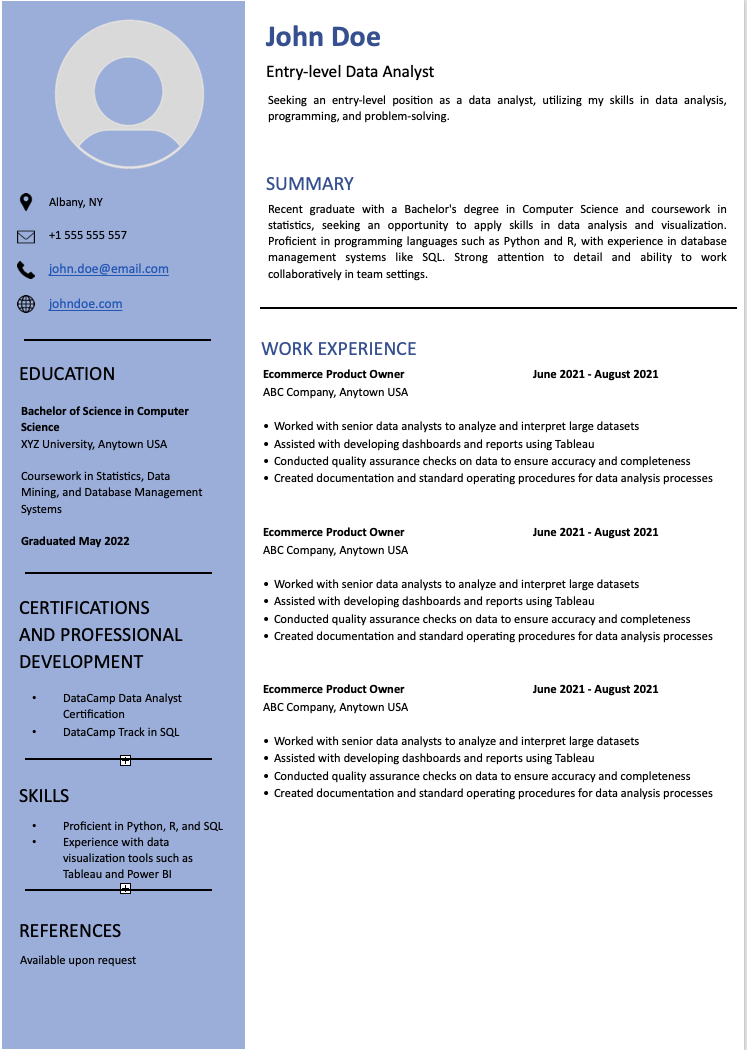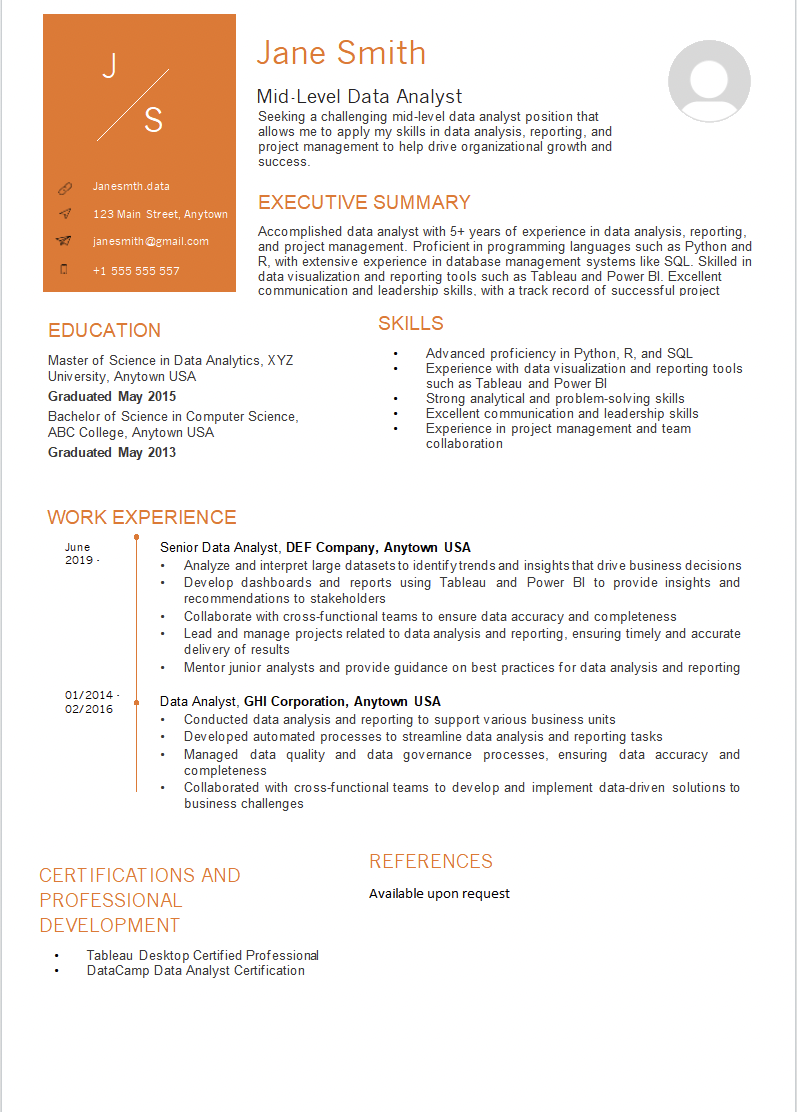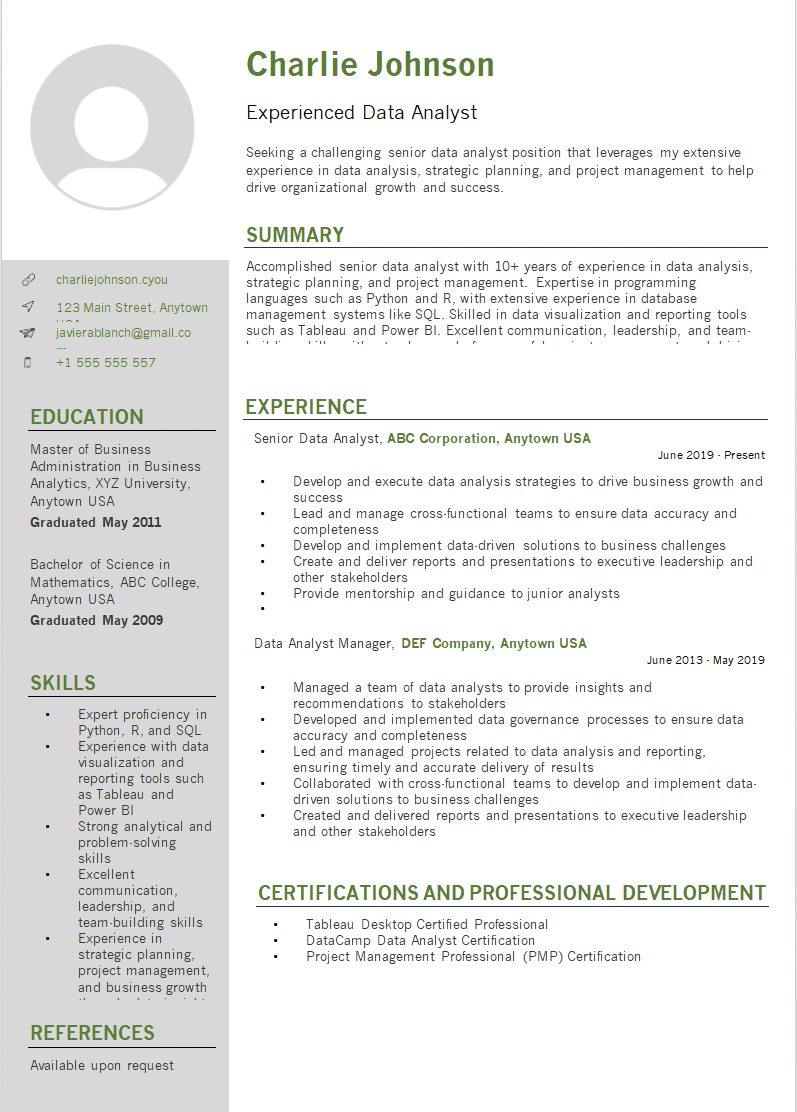If you’re a data analyst searching for your next career opportunity, one of the most critical components of your job search is your resume or CV. A data analyst resume is your first chance to make an impression to potential employers, and it needs to stand out from the rest to land an interview.
In this article, we'll discuss how to create a data analyst resume that will get you hired. We’ve also got some data analyst resume templates to help you get started.
5 Key Components of a Data Analyst Resume
If you’re hoping to create a winning data analyst resume, there are a few key components that will help you stand out from the crowd and capture the attention of hiring managers. We’ve outlined how to create a data analyst resume that will get you hired, below:
1. Craft a clear summary statement
Your summary should be brief and highlight your skills and experience as a data analyst. This section should be tailored to the job you are applying for and mention any specific skills or achievements that are relevant to the role.
2. Highlight your technical skills
As a data analyst, you need to showcase your proficiency in tools such as SQL, Python, R, and Excel. Make sure to list your technical skills in a separate section and mention any certifications or training you have completed.
3. Showcase your experience
Your work experience is critical to showcase your ability to apply your technical skills to real-world scenarios. Make sure to highlight your experience in data analysis, database management, and visualization.
Check out our tutorial on how to build a data science portfolio for some tips and tricks on sharing your experience.
4. Outline your education and certifications
While many employers will be more interested in your hands-on experience and portfolio, your education and certifications are still important. Make sure to highlight your level of education, including the institution you studied at, the name of your qualification, and the grade you attained, if applicable.
Check out our data analyst certification if you’re looking to boost your data analyst CV with a recognized professional certification.
5. Use data-driven achievements
Use quantifiable achievements such as the number of reports created, the size of the data sets you've worked with, or the improvements you've made to business processes through your analysis. This will showcase your impact in previous roles and provide potential employers with a tangible sense of what you’ve achieved so far.
If you’re an entry-level data analyst, you can rely on projects you’ve completed and your portfolio to quantify your achievements to date. You can also include any awards you’ve won in this section.
Become a Power BI Data Analyst
Master the world's most popular business intelligence tool.
Tips for Writing a Data Analyst Resume
As a data analyst, having a well-crafted resume is crucial in getting your foot in the door and landing your dream job. But with the abundance of applicants, how can you make your resume stand out? Here are some tips to help you create a data analyst resume that catches the attention of hiring managers.
Tailor your resume to the job description
Before sending out your resume, make sure to carefully read the job description and tailor your resume to fit the specific requirements of the job. Highlight your skills and experience that match the job requirements to show that you are a good fit for the position.
Use clear and concise language
Hiring managers are busy and don't have time to read through long and convoluted resumes. Use clear and concise language to highlight your skills and experience. Avoid using jargon or technical terms that may not be understood by non-technical people.
Showcase your skills and accomplishments
Include a skills section that highlights the relevant skills you possess as a data analyst. Additionally, list your accomplishments using specific and measurable examples. This shows that you have a track record of success and can bring value to the company.
Use easy formatting
Using bullet points makes your resume easier to read and allows hiring managers to quickly scan through your qualifications. Make sure to use bullet points to highlight your accomplishments, skills, and experience.
Keep it clean and professional
Avoid using flashy or overly decorative designs in your resume. Stick to a clean and professional design that is easy on the eyes. Additionally, make sure to proofread your resume for any errors or typos.
By following these tips, you can create a data analyst resume that stands out from the competition and catches the attention of hiring managers. Remember to tailor your resume to the job description,
Data Analyst Resume Examples
Below, we have some examples of data analyst resumes that you can take inspiration from when crafting your own. We’ll start with a general suggested structure, before going into specific examples of different levels of seniority.
General structure
Here is a general structure you can follow for your resume or CV:
[Your Name]
[Your Address]
[Your Phone Number]
[Your Email]
Objective:
[Insert a brief statement about what you hope to accomplish in the role of data analyst. This could include your interest in using data to make strategic decisions, your desire to analyze large data sets, or any specific goals you have in mind.]
Summary:
[In this section, provide a brief overview of your qualifications, highlighting your experience and skills as a data analyst. For example, you could mention your proficiency in data analysis software or your experience working with large data sets. This section should be concise and to the point.]
Education:
[Include information about your education, including the degree you earned, the name of the institution, and the dates you attended. You can also mention any relevant coursework or academic projects you completed.]
Skills:
[In this section, list your technical skills as a data analyst. This could include your proficiency in programming languages like Python or R, your experience with data visualization tools like Tableau, or your familiarity with database management systems like SQL.]
Experience:
[Include your work experience as a data analyst, starting with your most recent position. For each role, provide the following information:
- The name of the company you worked for
- The dates you worked there
- Your job title
- A brief overview of your responsibilities and accomplishments in the role
- Any specific data analysis projects you completed or contributed to
Make sure to highlight any quantifiable achievements, such as improvements you made to data analysis processes or the impact your work had on business outcomes.]
Certifications and Professional Development:
[If you have any relevant certifications or have completed any courses or training programs related to data analysis, list them here.]
References:
[Include the names and contact information of at least three professional references who can vouch for your work as a data analyst.]
Below, we’ve created some data analyst resume templates for different levels of seniority. You can download these to use as inspiration for your own CV or resume.
Entry-level data analyst resume template
This resume is suitable for those at the start of their career with little experience in the field. The focus is on expanding on work/practical experience and skills. Click on the image below to download the template.
Mid-level data analyst resume template
Here, you can see a resume example for a data analyst who’s been working in the industry for a few years. They’ll likely have more examples of work experience and different projects they’ve worked on.
Experienced data analyst template
For experienced data analysts, the template below shows an example of how you could approach your resume or CV:
Final thoughts
Creating a strong data analyst resume requires a combination of technical skills, experience, and attention to detail. It's important to highlight your achievements and quantify your impact whenever possible, using specific metrics and results. You should also tailor your resume to the job description, using relevant keywords and phrases. Finally, make sure your resume is well-organized and easy to read, with clear headings and bullet points.
Get certified in your dream Data Analyst role
Our certification programs help you stand out and prove your skills are job-ready to potential employers.

FAQs
Do I need a cover letter when applying for data analyst roles?
A cover letter can help you stand out by providing more context to your resume. While not always required, it offers a chance to explain how your skills and experience align with the role.
What if I don’t have much experience in data analysis?
If you’re an entry-level data analyst, focus on showcasing relevant projects, internships, or academic work. Use your portfolio to highlight the skills you’ve acquired and any achievements you’ve made in personal or academic projects.
How important is the education section in a data analyst resume?
While your hands-on experience is often more important, the education section still matters, particularly if you are an entry-level candidate or transitioning into data analytics.
Should I include a portfolio with my resume?
Yes, including a link to your data analysis portfolio can significantly boost your application. It allows employers to see examples of your work and gives you an opportunity to showcase your skills in real-world projects.
How long should a data analyst resume be?
A data analyst resume should ideally be one to two pages long. Focus on quality over quantity by highlighting the most relevant skills, experiences, and achievements for the specific job you’re applying to.
What can I expect from a data analyst job interview?
In a data analyst interview, expect questions about your technical skills, problem-solving abilities, and experience with data analysis tools. You may also be asked to solve data-related problems or analyze datasets in real time.
How can I prepare for a data analyst interview?
To prepare, review key concepts in data analysis, such as SQL queries, data visualization, and statistical methods. Practice solving problems and explaining your thought process, and be ready to discuss how you’ve used data to drive decisions in previous roles.
Check out our guides on data analyst interview questions and SQL interview questions to get prepared!
What’s the typical career progression for a data analyst?
A typical career progression starts with an entry-level data analyst role, advancing to positions like senior data analyst, data scientist, or business intelligence analyst. Some data analysts may also move into leadership roles like data analytics manager or data engineer.




